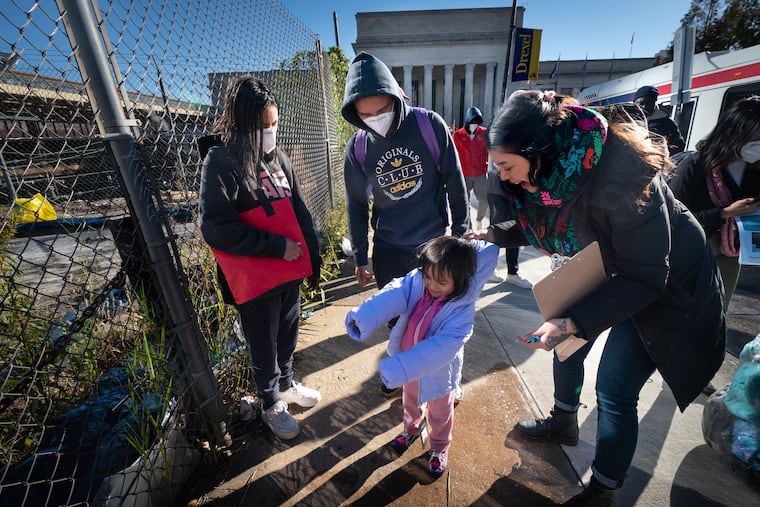Philadelphia is now officially a ‘Certified Welcoming’ city. Here’s what it means for immigrant communities.
The designation honors cities which have demonstrated high levels of immigrant inclusion and support.

When Manuel Portillo first came to Philadelphia thirty years ago, he and his wife tried to make themselves invisible. “I remember that it was more about hiding [and] staying... in our corner of the world,” he said, recalling how it felt to be an immigrant in the city back then.
“When I look now, it’s like immigrants feel at home. We feel that we belong.”
Portillo was born in Guatemala, and fled the country’s armed internal conflict in the 1980s seeking sanctuary from violence and human rights abuses. When he got to Philadelphia, he became a community organizer and worked alongside other immigrants trying to find their place. Now, Portillo is the director of community engagement with the nonprofit Welcoming Center, and is pleased with how far the city has come.
“When I look now, it’s like immigrants feel at home. We feel that we belong.”
And now, that change is officially being recognized. Last week, the City of Philadelphia announced that it had been designated as “Certified Welcoming” by the nonprofit organization Welcoming America. The honor recognizes cities making substantial commitments to immigrant inclusion and support.
The process of becoming Certified Welcoming includes thorough evaluation of a city’s programs, policies and practices designed for immigrant communities. Cities applying must conduct a self-audit of how well those practices meet Welcoming America’s standards in categories such as equitable access, government leadership and safety.
» READ MORE: Philly prides itself on welcoming immigrants. Now it wants to make it official.
Then, Welcoming America visits to conduct its own audit. In Philadelphia, the city also collaborated with local nonprofits, like the Welcoming Center, who work with immigrant communities as part of its self evaluation.
“[That’s] why I think my office in particular [was] so proud of [the certification],” said Amy Eusebio, the executive director of the city’s Office of Immigrant Affairs. “That was a lot of work to get past the finish line.”
Now, Philly is the newest and largest city in the country to be considered “Welcoming”.
Creating a precedent
With the city’s announcement, immigrant communities around Philadelphia may wonder how the designation will actually affect them. Eusebio said that most immediately, it sets a precedent.
The Welcoming certification must be renewed after three years through the same process, which is particularly notable with a new incoming mayoral administration.
Whichever candidate ultimately wins this year’s race will have to make a similar commitment towards immigrant support and inclusion, otherwise it will be clear that the cause is not a priority for them.
“When there are changes in mayor administrations and city leadership ... having an official designation of certification and a need to re-certify holds everyone accountable,” Eusebio said.
Peter Gonzales, the CEO of the Welcoming Center, worked closely with Eusebio’s office on the certification. He hopes that the honor sparks collaboration across the city.
“The certification gives the city the kinds of credibility as a leader in [this] space that [encourages] the business community and the philanthropic community to want to be aligned,” he said.
Gonzales explained how this kind of alignment hasn’t existed in Philadelphia in the past — the city, business and philanthropic communities have operated their policies and programs related to immigrants somewhat independently.
But now that the city has officially been recognized as a leader in immigrant inclusion, Gonzales would like it build cohesiveness.
”I think the certification can be leveraged in a meaningful way,” he said.
Eusebio agreed. “Though we have a bunch of really cool policies and programs in Philadelphia, we [have] never declared an official strategy or plan as a city that included both the private and public sector,” she said. The Office of Immigrant Affairs is beginning to work on such a plan, which will be modeled after other welcoming plans, like in Pittsburgh and statewide in Michigan.
“[We need] a clear articulation of: immigrants are important to our city. Here’s why, and here are the goals and strategies that we are actively employing and investing in to ensure that immigrants are successful in [Philadelphia],” she said.
» READ MORE: Philly’s immigrants are bracing themselves for another Trump presidential campaign
The next generation
Those involved with the Welcoming certification were all quick to mention that it is not their end goal. There’s much more they would like to do to make life easier and more welcoming for immigrants in Philadelphia.
“I’m very happy [that] Philadelphia has been certified as a Welcoming city. To be honest, that touched my heart,” Portillo said.
“[We need] a clear articulation of: immigrants are important to our city.”
“But I will also say that, in the back of my head, I also worried [when I heard],” Portillo said, “because sometimes people may take that as having arrived at a place where we accomplished [everything] and where we are done ... we need to work very hard”
Gonzales is optimistic about the work ahead to make Philly even more welcoming. Especially because of those who will carry that work on into the future.
“The generations that are coming seem a lot less patient, and I say that in a very positive way.
“I think that there’s an interest in accelerating change for the better, demanding equity, recognizing that the quality of life [for everyone] is better when people are welcoming and supporting each other.”